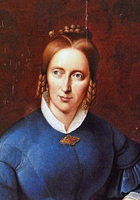Annette Von Droste-Hulshoff
Annette Von Droste-Hulshoff Poems
The year at its turn,
the whirring thread unrolls.
One hour more, the last today,
and what was living time is scrolls
...
As the trembling banished man
Stands at his homeland border
And backwards turns his gaze,
...
How dreadful it is to go over the moor
When it is teeming with will o' the wisps
And mists are whirling like phantoms
...
Sweet peace, sweet delight of grass,
Of its aroma breathed about me:
Deep draught, deep, deeply drunk draught.
...
Farewell! There can be no other way.
Let your fluttering sails be hoist.
Left alone and castle bound I stay
...
Belovèd, when my spirit has departed,
Lose no tears for me;
For, where I linger, there is peace,
And I am bathed in lasting day.
...
I leant upon the balcony rail
And there, for your mild light, I waited.
High above me like crystals of clouded ice
...
Oh night, you canopy of embroidered gold!
Oh moon, you lamp of silver!
You, who shroud the world around
...
I stand aloft on the balcony,
The starlings around me crying,
And let like maenad my hair stream free
...
Annette Von Droste-Hulshoff Biography
Annette von Droste-Hülshoff ( January 10, 1797 – May 25, 1848) was a 19th century German author, and one of the most important German poets. She was born at the family seat castle Burg Hülshoff (now a part of Havixbeck) inside the Prince-Bishopric of Münster into an aristocratic, Catholic family of Westphalia. She was educated by private tutors and began to write as a child, but did not publish any of her work until she was forty years old. Among her best-known writings are the cycle of poems Das geistliche Jahr (The Spiritual Year) and the novella Die Judenbuche (The Jew's Beech). Her early intellectual training was largely influenced by her cousin, Clemens August Freiherr von Droste zu Vischering, who, as archbishop of Cologne, became notorious for his extreme ultramontane views (see below). She received a wider liberal education than was common for aristocratic women of her time. Despite her withdrawn and restricted life she corresponded with intellectual contemporaries such as the Brothers Grimm. As her health continually worsened, earning a living through her writing was never an option. Despite this, she took her literary work very seriously. She was able to break from her circumstances during a trip to Lake Constance, originally only to visit relatives. From 1841 she stayed with her brother-in-law, Baron Joseph Maria Christoph von Lassberg at the Meersburg Castle. In 1837 she became friends with the author Levin Schücking, who, through her agency, became the librarian at the Meersburg Castle. Annette von Droste-Hülshoff is considered the most gifted and original of German women poets. Her verse is strong and vigorous, but often unmusical, if not to say harsh; one looks in vain for a touch of sentimentality or melting sweetness in it. That this harshness in a way reflects her conditions as a woman in 19th century Germany can be seen in poems like "Am Turme" (https://www.wortblume.de/dichterinnen/amturme.htm). As a lyric poet, she is at her best when she is able to attune her thoughts to the sober landscape of the Westphalian moorlands of her home. Her narrative poetry, and especially Das Hospiz auf dem Großen St. Bernard and Die Schlacht im Loener Bruch (both 1838), belongs to the best German poetry of its kind. She was a strict Roman Catholic, and her religious poems, published in 1852, after her death, under the title Das geistliche Jahr, nebst einem Anhang religiöser Gedichte, enjoyed great popularity. Annette von Droste-Hülshoff died in May 1848 at the Meersburg Castle, probably from pneumonia.)
The Best Poem Of Annette Von Droste-Hulshoff
The Last Day Of The Year (New Year's Eve)
The year at its turn,
the whirring thread unrolls.
One hour more, the last today,
and what was living time is scrolls
of dust dropping into a grave.
I wait in stern
silence. O deep night!
Is there an open eye?
Time, your flowing passage shakes
these walls. I shiver, my
one need is to observe. Night wakes
in solitude. I light
my eyes to all
that I have done and thought.
All that was in my head and heart
now stands like sullen rot
at Heaven's door. Victory in part -
the rest a fall
into dark wind
whipping my house! Yes, this year
will shatter and ride on the wings
of storm; not breathe under the clear
light of stars like quiet things.
You, child of sin,
has there not been
a hollow, secret quiver each
day in your savage chest,
as the polar winds reach
across the stones, breaking, possessed
with slow and in-
sistent rage? Now my lamp
is about to die; the wick
greedily sucks the last drop of oil.
Is my life like smoke lick-
ing the oil? Will death's cave uncoil
before me black, damp?
My life breaks down
somewhere in the circle of
this year. Long have I known
decay. Yet my heart in love
glows under the huge stone
of passion. I frown,
sweating in deep
fear, my hands, forehead wet.
Why? Is there a moist star
burning through clouds? Is it
the star of love, with far
light, dim from fear, a steep
booming note. Do you hear?
Again! Song for the dead!
The bell shakes in its mouth.
O Lord, on my knees I spread
my arms, and from my drouth
beg mercy. Dead is the year!
Annette Von Droste-Hulshoff Comments
Trying to find poem and year she wrote At night, when heavenly peace is flying Above the world that sorrow mars Ah, think not of my grave with sighing For then I greet you from the stars7

Trying to find a poem ‘ I have slipped into the next room